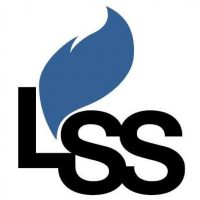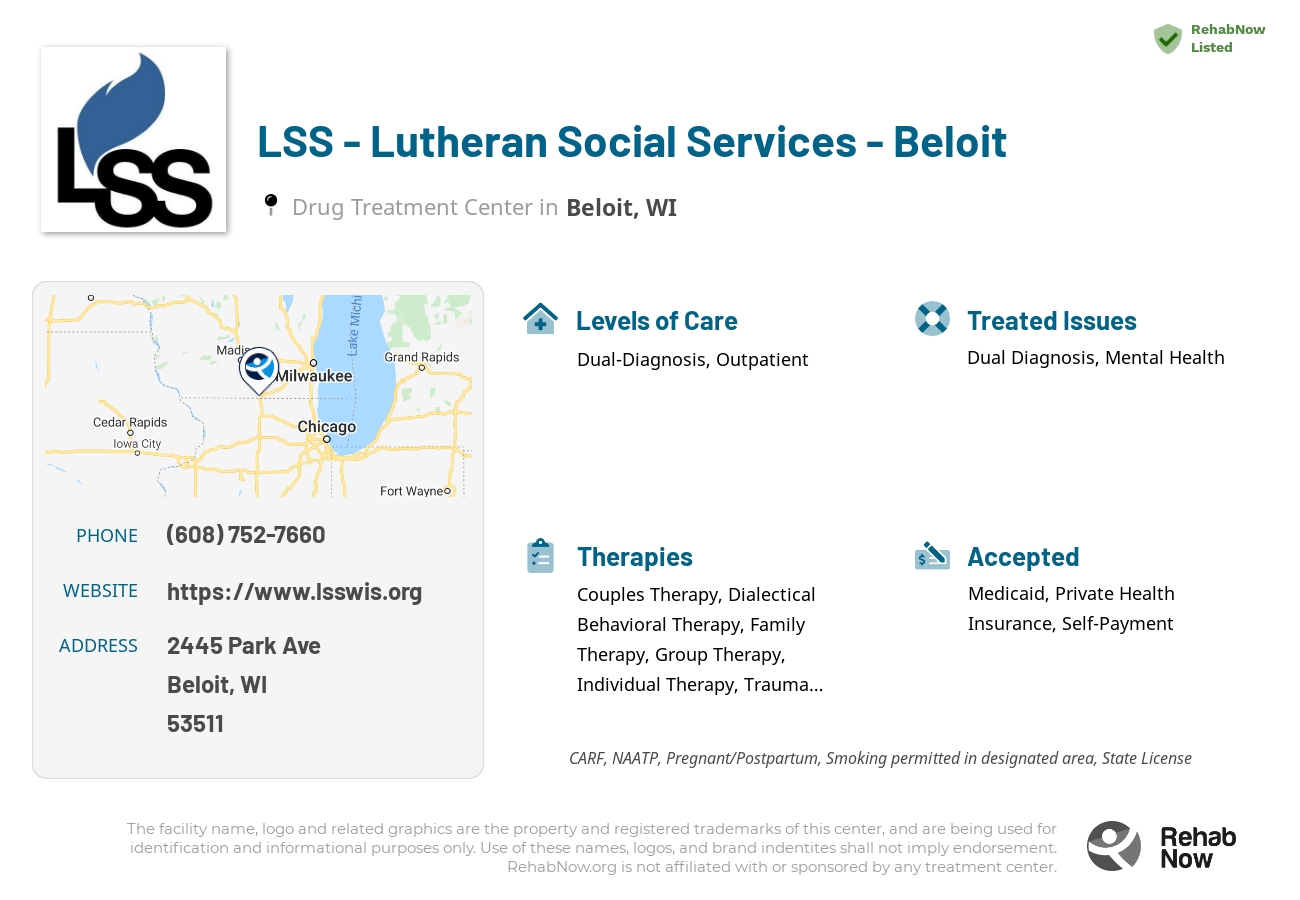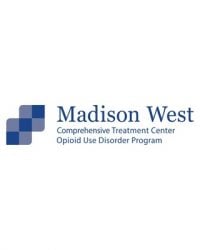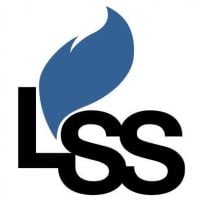LSS - Lutheran Social Services - Beloit
Drug Rehab Center in Beloit, Wisconsin
Lutheran Social Services - Beloit provides mental health and dual diagnosis treatment through various therapeutic techniques, including couples therapy, DBT, family therapy, group therapy, individual therapy, trauma therapy, dual-diagnosis, OP, and CBT, and accepts private health insurance.
About This Wisconsin Facility
LSS - Lutheran Social Services - Beloit is a well-known Dual Diagnosis, Mental Health Treatment Facility located in Beloit, Wisconsin. This center specializes in providing treatment for individuals who are struggling with both mental health disorders and substance abuse issues. With a focus on dual diagnosis, LSS - Lutheran Social Services - Beloit aims to address both conditions concurrently to promote long-term recovery and overall well-being. This facility offers various levels of care, including outpatient programs, allowing individuals to receive treatment while still maintaining their daily responsibilities. LSS - Lutheran Social Services - Beloit accepts Private Health Insurance, making it accessible to individuals with different insurance coverage.
LSS - Lutheran Social Services - Beloit offers a range of effective treatment services and methods to address addiction and substance abuse. Their approach incorporates dual diagnosis, meaning they provide specialized care for both mental health disorders and substance abuse issues. With professionals who are experienced in treating dual diagnosis, LSS - Lutheran Social Services - Beloit aims to address the root causes of addiction by providing comprehensive and integrated treatment. Through outpatient programs, individuals have the opportunity to receive treatment while remaining in their community and attending to their personal responsibilities. This facility also accepts Private Health Insurance, making it more accessible for individuals seeking help.
Genders
Ages
Modality
Additional
Conditions and Issues Treated
When addiction and psychiatric issues co-occur, the addict’s recovery is more successful when both conditions are treated. A dual diagnosis refers to a condition in which the patient is diagnosed with two health issues: addiction and bipolar disorder.
Usually, dual diagnosis sufferers are prescribed a combination of treatments for each condition. The most common therapies are psychotherapy, behavioral therapy, spiritual counseling, 12-step programs, and medication management.
Psychiatric conditions are an obstacle to recovery because they can create roadblocks to a healthy lifestyle. Drugs and alcohol may be used as a means of self-medication, which can have dangerous consequences. Over time, addicts build up a tolerance and suffer withdrawal symptoms when drug use is stopped.
With the proper treatment, dual diagnosis sufferers can overcome their conditions and achieve lasting sobriety.
Levels of Care Offered at LSS - Lutheran Social Services - Beloit
This center offers a variety of custom treatment tailored to individual recovery. Currently available are Dual-Diagnosis, Outpatient, with additional therapies available as listed below.
Individuals struggling with drug addictions can get help from several treatment options, including inpatient and outpatient programs. Outpatient drug treatment programs can also provide patients with different levels of care, usually depending on the patient’s degree of addiction.
At an outpatient program in Beloit, a patient will attend a recovery program during the day and return home in the evening. Suppose a patient is struggling with drug addiction. In that case, an outpatient program can serve as an effective transition point during the recovery process.
Therapies & Programs
Individual therapy is a critical component of addiction recovery. It allows the patients to go deep into their core issues and discover how to handle those problems better. Therapy can be conducted in individual sessions as well as group settings. In individual therapy for addiction, the patient meets with their therapist one-on-one to focus on the underlying issues. This allows patients to open up and discuss personal topics they may not feel comfortable discussing in a group setting. This type of therapy can help develop solutions specific to each patient, which helps speed up the recovery process.
Couples therapy is beneficial for couples in which at least one partner has a substance use disorder. This type of therapy can help partners improve communication skills, which is an important factor in a healthy relationship. It can also help partners better understand one another so they have a greater understanding of how the other partner may be feeling.
Benefits of couples therapy include:
- Improvement in communication skills
- Increased understanding of the dynamics within a relationship
- Increased sense of support and trust in the relationship
- Better teamwork between partners/increased willingness to listen and work together
- Enhanced tolerance of each other’s shortcomings
- Improved ability to have open, honest communication with each other
Family therapy is a crucial part of drug treatment and getting sober. It is one of the most effective ways to help addicts stay on the path to long-term sobriety. When a drug addict decides that they want to try and get sober, it takes the support of every person they love to succeed. It can be incredibly difficult for loved ones to watch an addict go through the pain and suffering of withdrawal, but by being there with them and supporting them, they can help to make sure that the addiction never returns.
One of the most important parts of family therapy is the relapse prevention plan. During treatment, therapists and doctors will often sit down with the addict and their family to develop a plan in case the addict ever feels like they want to use again. This plan should involve steps the addict and family can take together to prevent them from relapsing in the future. An addict’s family can play a vital part in helping them to avoid relapse because they can spot the warning signs and help them get back on track before it becomes too much of a problem.
Group therapy helps prevent addicts from feeling isolated or unique in their situation by offering a sense of comfort and fellowship. It also creates a forum for addicts to build their support systems and learn from each other. The group therapy sessions at LSS - Lutheran Social Services - Beloit occur in a group setting rather than one-on-one to create a safer, controlled environment where addicts feel comfortable.
Trauma therapy helps people dealing with addiction by allowing them to confront the traumas of their past and move past them. It is important to note that trauma therapy should not be confused with PTSD (post-traumatic stress disorder) Rather, it is used to treat the effects of trauma, which are often at the root of addiction.
Dialectical Behavior Therapy was developed in the 1980s to treat chronically suicidal individuals. It is a cognitive-behavioral therapy that combines strategies derived from Zen Buddhism, such as mindfulness training. DBT has been adapted for use with other types of psychiatric problems, including substance abuse and personality disorders. DBT aims to help patients change their thinking and behavior, instead of relying on medication.
Cognitive Behavioral Therapy (CBT) is a common therapeutic approach to help drug addicts. It teaches addicts new ways of thinking and behaving so that they can avoid relapse. There are several forms of CBT used in drug rehabilitation centers.
Cognitive Restructuring helps addicts identify faulty, negative thinking so that they can work together with the therapist to find healthier ways of thinking, resulting in better decision-making.
Cognitive Behavioral Therapy for Addiction uses the principles of CBT to help treat addiction. It focuses on specific aspects of each person’s thinking, feeling, physiology, and behavior. It aims to identify specific problems in these areas and create a personalized treatment strategy.
Payment Options Accepted
For specific insurance or payment methods please contact us.
Is your insurance accepted?
Ask an expert, call (888) 674-0062
Lutheran Social Services – WI Associated Centers
Discover treatment facilities under the same provider.
- LSS - Lutheran Social Services - Exodus House in Hudson, WI
- LSS - Lutheran Social Services - Community Transition Center in Eau Claire, WI
- LSS - Lutheran Social Services - Dodge County Group Home in Beaver Dam, WI
- Lutheran Social Services - Eau Claire in Eau Claire, WI
- LSS - Lutheran Social Services - Wazee House in Black River Falls, WI
Learn More About Lutheran Social Services – WI Centers
Additional Details
Specifics, location, and helpful extra information.
Beloit, Wisconsin 53511 Phone Number(608) 752-7660 Meta DetailsUpdated November 25, 2023
Staff Verified
Patient Reviews
There are no reviews yet. Be the first one to write one.
Beloit, Wisconsin Addiction Information
Wisconsin has some of the highest rates in the United States for both adolescent and adult substance abuse. Since 2009, the state has been experiencing the same escalating rates of drug abuse and addiction as the rest of the country. The major concerns are the misuse of prescription painkillers and the escalating number of deaths due to alcohol-related liver disease.
65.3% of arrests for drug crimes in Beloit were for possession, not trafficking or sales. Drug abuse problems such as heroin and other opioid addiction, marijuana, methamphetamine use, and cocaine addiction are quite common in Beloit. More than 11% of Beloit's population has used marijuana at least once in their life. Beloit, Wisconsin, offers a variety of therapeutic interventions such as individual counseling, group therapy, family counseling, psychoeducational classes, and experiential therapies.
Treatment in Nearby Cities
- Monroe, WI (31.5 mi.)
- Shawano, WI (156.5 mi.)
- Slinger, WI (66.5 mi.)
- Kiel, WI (107.3 mi.)
- Mequon, WI (68.8 mi.)
Centers near LSS - Lutheran Social Services - Beloit
The facility name, logo and brand are the property and registered trademarks of LSS - Lutheran Social Services - Beloit, and are being used for identification and informational purposes only. Use of these names, logos and brands shall not imply endorsement. RehabNow.org is not affiliated with or sponsored by LSS - Lutheran Social Services - Beloit.







